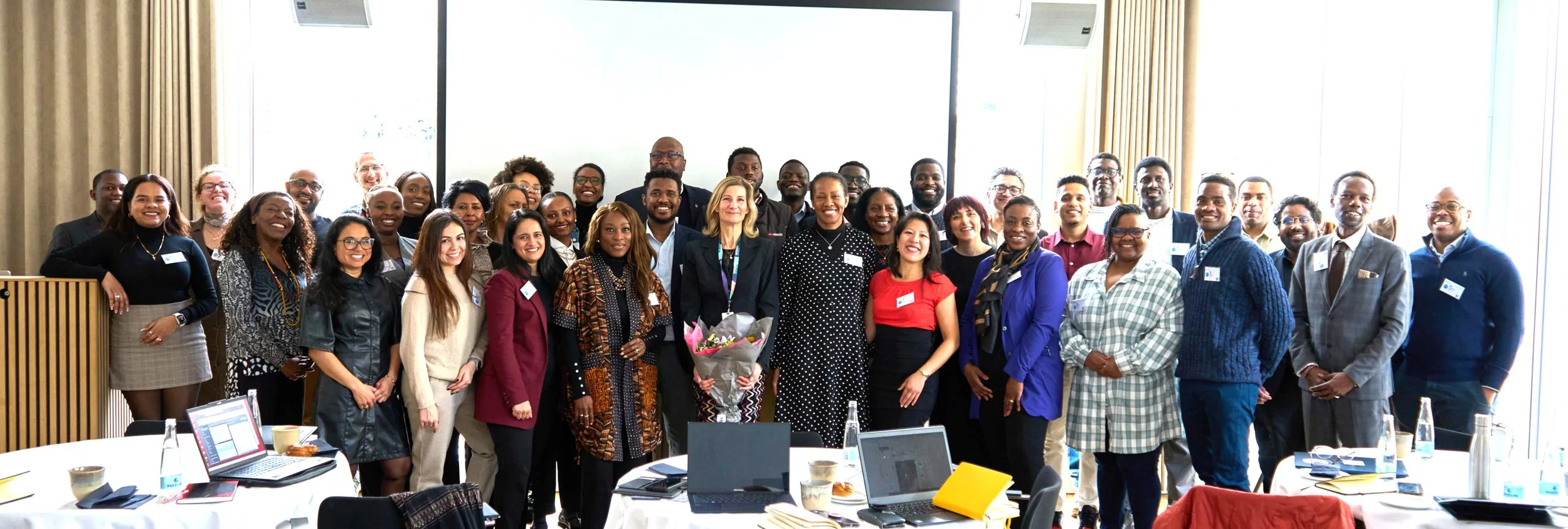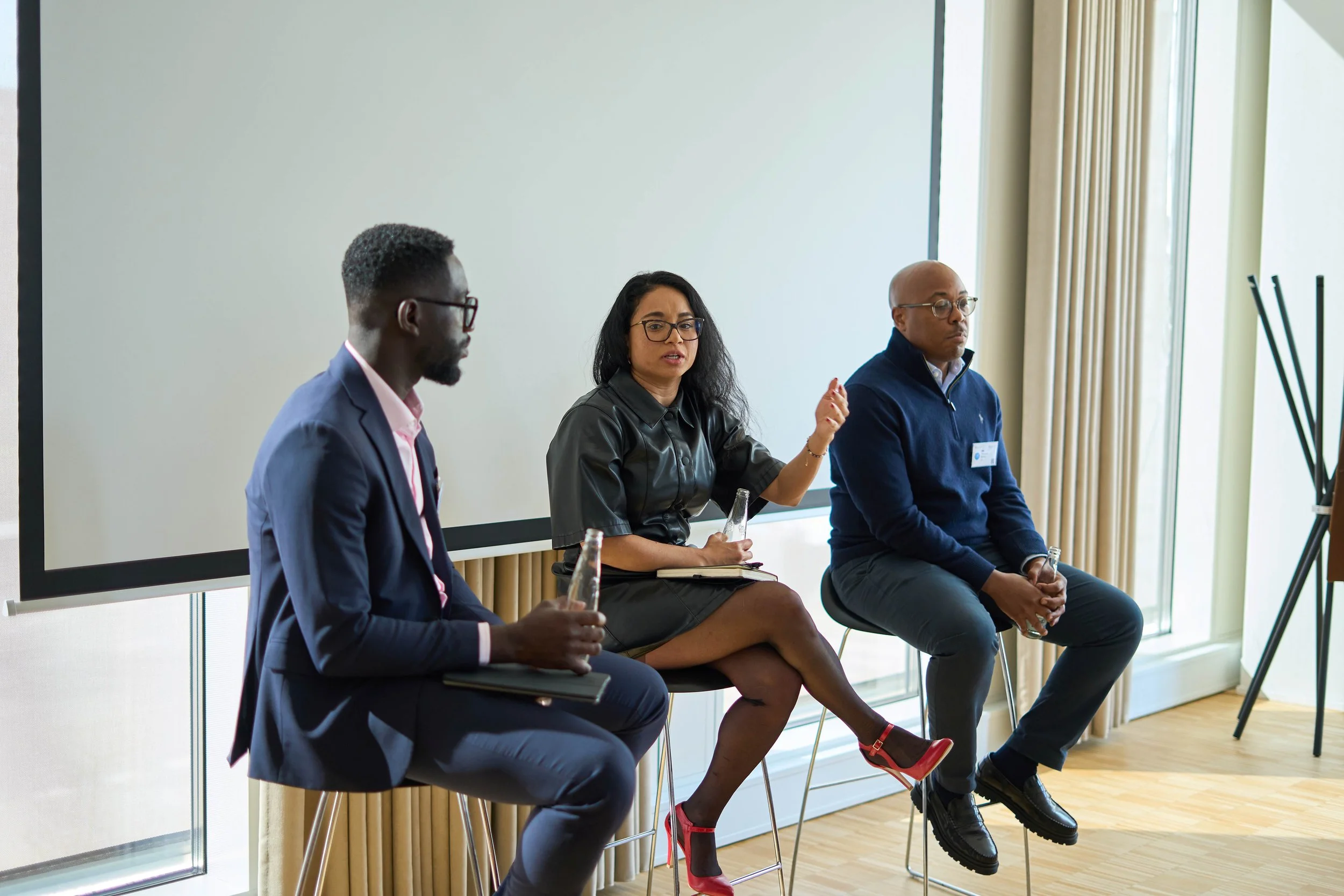Intersection of AI and Diversity
Microsoft HQ Denmark - AI Workshop 2025 (Photographer: Marcus Pobee)
I had the pleasure of presenting at a Panel discussion with Microsoft and Danske Bank to the Professional Women of Colour and Brotherhood of Professionals of Colour network and their guests.
The main talking points were around the themes of AI and Diversity and how to ensure a fair future for all in the new AI economy.
I am very passionate about this topic as the first question for the panel, right off the bat, was “What is happening in the USA?”
It started a flood of emotions in me, not just because of the intensity of the news from my home country, but that it made me realize how Privileged I was to be sitting in a room of diversity, of people from all walks of life, in Microsoft HQ, allowing us the space to voice our concerns and have those hard talks. My answer to the question was simple and to the point, and a call for action to start everyone’s AI literacy journey.
“If you want to know what unregulated, un-democratic, non-diverse nor inclusive AI looks like, that is your answer...””
This privilege I will not take for granted and I will continue to fight for data rights as a human right. I will continue to be the devil’s advocate in this AI hype and bring the problem down to the basic human needs that we are sorely missing in the conversations. It is a stark reminder that the entangled Geopolitics of AI will affect all of us in the coming months and near future.
Panel Discussion - AI and Diversity Photo by Marcus Pobee
It was reminder to me that AI can discourage and disempower minority voices like mine to be part of that conversation. I mentioned this in a recent video that was edited from a previous talk, on how we can start to align AI to society, and what can we do from an individual’s perspective.
I will expand on some of the things mentioned during the workshop and discussion that I hope will encourage further investigation, so that we can continue to build safe spaces, where we are allowed to challenge the AI hype and remember the impact it can have on everyone.
Here are some resources to dive deeper into topics that I find relevant. The importance of awareness for marginalized and underrepresented groups to be mindful of spans into cultural, cognitive, and algorithmic bias (just to name a few) and how we need to demand transparency, so we can address present and potential problems.
1) MIT RISK REPOSITORY: An accessible overview of threats from AI
Link: https://airisk.mit.edu/
The AI Risk Repository has three parts: The AI Risk Database captures 1000+ risks extracted from 56 existing frameworks and classifications of AI risks; The Causal Taxonomy of AI Risks classifies how, when, and why these risks occur;
2 ) AI for Good Denmark : Open data spaces repository
LINK: https://www.aiforgooddenmark.net/resources/opendatasources
I have gathered open source data spaces from all over the world that is helping building more data sets to help societies tackle the most challenging problems. Please reach out to me if you know of others.
3) Trust Worthy AI - African Perspectives
Link: https://link.springer.com/book/10.1007/978-3-031-75674-0
This book provides a more Trustworthy approach to AI, especially in light of minority voices and the challenge placed before us, to fight NOW for inclusion outside the US context.
My closing remarks was a Call-to-Action for everyone to start their AI literacy journey and to be advocates for a more inclusive culture of democratizing AI and harnessing its potential to eliminate biases on many fronts.
My website offers a curated repository of AI literacy initiatives, educational courses *free, as well as policy, tools, and reports to help people start their journey.
I was honoured to participate in this talk and to share with others the research and initiatives happening in Denmark and around the world, that helps bring voices like mine to the table. I was impressed by the calibre of critical questions that were both philosophical in nature and thought-provoking, that opened up deeper revelations of the societal implications on what that can look like for our communities here and abroad.
Photo by Marcus Pobee
The complexities of AI can be daunting, but if we all play a part to educate ourselves on what AI is, what it can do for us and to us, and how best to allocate our resources and attention to tackle our societal problems — we will ALIGN AI to what we want to see in the future.
I will end my reflection with a great quote from Dr. Joy Buolamwini: Best-Selling Author of Unmasking AI:
“AI will not solve poverty / discrimination / climate change… because these are not technical matters. We cannot use AI to sidestep the hard work of organizing society so that where you are born, the resources of your community, and the labels placed upon you are not the primary determinants of your destiny”



